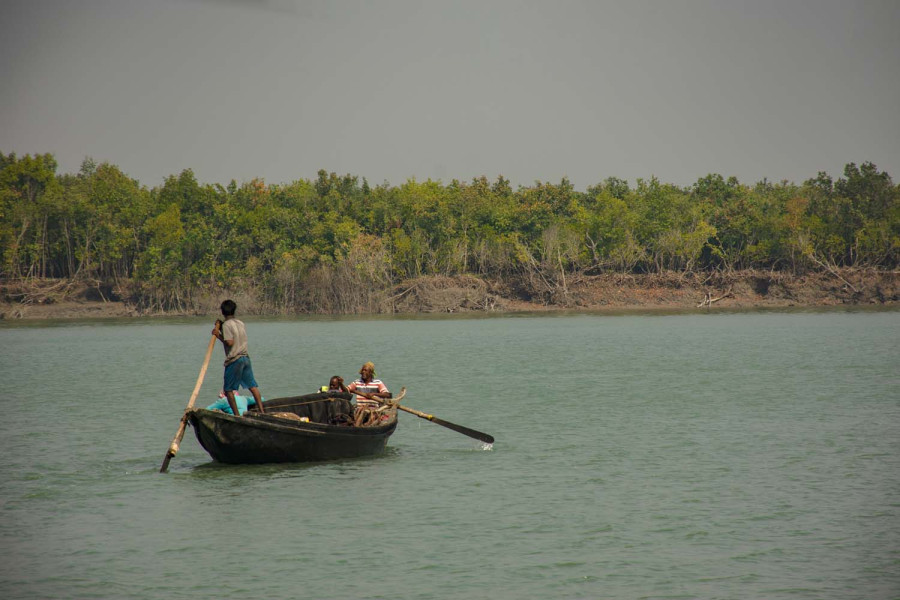Fiction Park
Chasing shadows
My father had sold me as a slave in a town called Matsye, an island in Lake Chiling known for its fishing business.
Sandesh Parajuli
My father was a baker. You know, they called alcohol a cake.
He worked for a gang that illegally transported Nepali booze to India across the Mechi river. He was drunk most of the time, and he brought home very little money. My mother didn’t want him, so she fled with a carpenter from Morang. It seems she didn’t want me either. I was just 18 months old.
When I turned nine, my father brought us a fish for dinner. That night, I slept so well. Perhaps it was the best sleep I have had in the last four years. Four years. That’s how long it’s been.
Deep sleepers hear evil whisper, they said. To sleep deep is to sin. I woke up in hell in the morning. My father had sold me as a slave to a town called Matsye, an island in Lake Chiling known for its fishing business.
Lake Chiling is so big that educated people say it covers one-third of the country. I don’t know what a country is, but I understand they mean very big. Khatris, Thapas, and Bistas ruled the lake.
Khatris were my masters. They said they bought me for three thousand rupees. That’s more than what my father made in a month. The contract was for five years. When Khatris handed me a net and pushed me to the skiff, I knew I would eat fish every day, but I would never get the same sleep.
The first time on the boat, I was terrified. But I met Suman there. Strangely, he didn’t have little fingers on both his hands.
“You look scared. Do you know how to swim?” he asked.
I shook my head.
“Children like us have died their first day here,” he said.
“Will you teach me to swim?” I asked as a cacophonous motorboat made a dart toward us.
“Damn, they are again here,” he said irritably. There were three boys, slightly taller than us. Their modern boat started encircling our old-wooden skiff. They began teasing us for our skin, clothes, and ‘dirty, miserable’ life.
I could not hold on. I began swearing and cursing. Suman kept urging me to stop.
Over the next few days, Suman taught me to swim. He taught me not to fight when confronted by the masters’ sons. Rather, he taught me where to run and hide.
Importantly, he taught me not to flee slavery without proper plans; else they would catch and cut a finger: a ‘gentle’ reminder of what would happen if attempted again.
“I failed twice,” he would chuckle at his humble, self-deprecating humour. “If you decide to leave, tell me you would do better than this,” he would raise his palms.
“Then they will beat you,” I would say.
“Then you will be free,” he would reply.
Suman became the reason for my survival in that hostile land, and I loved him.
Sometimes, before sunrise, Suman and I would climb up the hill in the middle of the island and wait for the sun to emerge from the eastern horizon of the lake. As the sun ascended, we would glance down toward the water. The golden glitters would be dazzling as the rays bounced off the sheet mirror stillness of the surface and reached our eyes. We would shield our eyes with a cupped hand and laugh. Still laughing, we would spread our arms wide and spin until our heads rang and then collapse onto the damp ground, staring up at the boundless, coral sky as though it held the secrets to our salvation.
Those were the only moments we felt free and living.
There are more than 500 child slaves here in Chiling. The fishes in the lake are small. Masters say small hands are needed to pick them from nets. That’s just a pretext. It is actually small wages. If small hands were so useful, they would not cut those small fingers.
There is an entire forest under the lake. Occasionally, the plants would snag the net. Suman used to swim under the boat to fix it. Sometimes, there wouldn’t be any fish around. It was, again, Suman to swim to see where they were concentrated.
Friends would often ask me why it was always Suman who dived in from our boat.
“I don’t know,” I used to say.
Suman was very good at what he did. His first five years ended during my third. The masters flattered his father and paid him extra. He was re-bought for the next five years.
This hugely affected him. He always wanted to read. He understood the perils of life bereft of education and feared systematically falling under the fishing trap his entire life.
He started behaving weirdly. He would wake up in the middle of the night and wouldn’t return until morning. Despite my persistent inquiries, he remained reticent. Eventually, he told me he secretly worked for the other master at night to collect enough money to bribe the night watchmen.
I am ‘almost ready’ now, he said.
It was 3 am. As usual, Suman was not around. I had a fever, and the bed was too warm. I decided to take a stroll along the shore.
Twenty minutes, and I was tired. As I prepared to rest under a cottonwood tree, I could sense something breaking the stillness of the lake. I heard splashes in the distance. Initially, they were gentle, and then, they turned frantic. I squinted. There was something in the water. Someone. Drowning.
A moment of terror gripped me. My mind raced, torn between the instinct to save the life and the fear of potential consequences. I knew jumping was the right thing to do, but what if he dragged me down in desperation? I was not strong. I was sick. I thought about Suman; he was strong and smart. He could have easily saved him, but I had no idea which side of the lake Suman was in then.
The drowning friend couldn’t call for help, but I could, and I did, but to no avail.
No one was around, and I was not jumping.
Silence ensued after a few minutes of struggle, and the empty boat soundlessly glided upon the shimmering surface of the lake beneath the soft glow of the moon.
In the morning, rumours spread that someone from Bista’s boat got trapped on his own net while diving at night.
Three important things marked that day: I proved my incompetence to myself, Suman didn’t return: he fled, and the masters and their sons mercilessly beat me, asking his whereabouts. Suman wouldn’t return; the beatings and inquiry persisted. Then I learned a lesson for my life.
*
It is midnight. I look at a dense forest ahead. I just crossed the lake. It was the festive time on the island, and the night watchmen were all drunk. I can’t take the road; the gatekeepers will know. And there are tigers in the forest, but I should go. Better to be someone’s food than to rot underwater.
“Hey, who’s there?” Someone yells. I turn around. It is the Ratan Bista. Suman had told me that Bistas mostly carried their business at night.
“Damn!” I exclaim in terror and run, but my bagpack is too heavy to allow swift motion.
Soon, a strong hand clutches my shoulder.
“Now that I have caught you, I could send you to your master, and he will gift me your little finger, which I will feed to my chicken. Or, I have a proposition.”
“What proposition?”
“You could work for me during nights like your friend did before he died. And I will pay you, so you can sometimes eat good food at the eateries. Chicken, if you want.”
“He didn’t die. He fled.”
“You think your friend fled? You still don’t know the truth, do you? Remember the boy that drowned near the cottonwood tree last week?” he smirked. “Well, that is the only way to leave this place. Oh, actually, you would still fail. Nobody cares to bring your body to the shore and send it to your parents. The lake will have you.”
I was paralysed. Mr Bista lifted up my bag pack and moves towards his boat. “Come with me, my little soldier. I have a job for you,” he yells.
A sense of defeatism runs down my spine, and I immediately become a sheep. As I follow him, I constantly get haunted by the truth I never exclaimed.
Remember Suman always diving from our boat? The truth is he did it so that I didn’t have to.
If I had known Suman was the one drowning near the cottonwood tree, would I have jumped?
Parajuli is an aspiring writer.




 9.6°C Kathmandu
9.6°C Kathmandu










